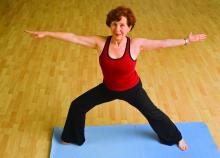Yoga may be a feasible and safe add-on therapy for patients with irritable bowel syndrome, based on a systematic review of six randomized controlled trials of 273 patients published in the December issue of Clinical Gastroenterology and Hepatology.
Yoga significantly outperformed no treatment and resembled pharmacologic therapies for IBS on measures of bowel symptoms, anxiety, and quality of life, said Dania Schumann of the University of Duisburg-Essen, Essen, Germany.
“Yoga also seems to be equally effective as a walking program in improving patient-reported outcomes,” she and her coinvestigators wrote. But “wide methodological heterogeneity” and a “mostly unclear risk of bias,” precluded a direct recommendation for yoga in IBS, they said. Nonetheless, “its practice need not be discouraged in this patient population, especially when [patients] believe that it benefits their health, quality of life, or IBS-related comorbidities.”
Experts have increasingly emphasized the role of stress, psychological disorders, and the bidirectional gut-brain axis in IBS, the reviewers noted. Because yoga had been found to cut stress and improve psychological functioning in past studies, they hypothesized that it also might improve IBS symptoms. By searching MEDLINE/Pubmed, the Cochrane Library, CAM-QUEST, CAMbase, and IndMED for studies of IBS and yoga, they identified 93 records, including six randomized controlled trials from India, the United States, and Canada. One trial defined IBS based on Rome I criteria, another used Rome II criteria, three used Rome III criteria, and the sixth trial relied solely on clinical and laboratory measures. Patients ranged in age from 14 to 44 years (median, 32 years), and most were female. They were allowed to continue their usual IBS care (Clin Gastroenterol Hepatol. 2016 Apr 22. doi: 10.1016/j.cgh.2016.04.026). Two trials compared 9-12 weeks of yoga with pharmacologic therapies. In one study, yoga and loperamide were associated with similar improvements in bowel symptoms, state anxiety, gastric motility, and other measures of autonomic reactivity. The second study found no significant differences in the colonic myoelectrical effects of yoga, placebo, and a regimen of psyllium husk, propantheline, and diazepam.
Three studies compared 4-12 weeks of Iyengar or hatha yoga with usual IBS care. Yoga outperformed standard care on measures of IBS symptoms, quality of life, psychological distress, and fatigue in two trials. The third study found a benefit for yoga after wait-listed controls joined the yoga intervention and the researchers combined their data with the other yoga group.
The sixth trial compared yoga with a walking program and found similar effects. Yoga was associated with significant improvements in abdominal pain, visceral sensitivity, and GI symptoms, while walking improved gastrointestinal symptoms, negative affect, and state anxiety. But at 6-month follow-up, walkers had fewer gastrointestinal symptoms than did the yoga group, perhaps because a walking program is easier to maintain at home, the reviewers noted.
Only one trial adequately performed adequate blinding during outcome assessments, and several others were at high risk of performance bias, reporting bias, and attrition bias, the reviewers said. The trials also did not adequately describe methods to randomize patients or conceal group allocations, and “selective reporting and high dropout rates [were] an issue,” they added.
Adverse events related to yoga included three cases of temporarily aggravated lower back pain and one fall after a participant slipped and hit his knee while in a headstand. However, only two trials assessed adverse events, the reviewers noted. “Future studies should ensure rigorous reporting of adverse events, and the correct use of terminology,” they said.
Because meditation, breathing exercises, and yoga seem to improve both stress and IBS symptoms, researchers should consider these practices when studying patients with “an increased gastrointestinal response to stress,” the reviewers concluded. “So far, the recent global guidelines of the World Gastroenterology Organization on IBS consider sufficient physical activity and relaxation techniques to be appropriate nonpharmacologic approaches.”
The reviewers did not report funding sources. They had no relevant conflicts of interest.


